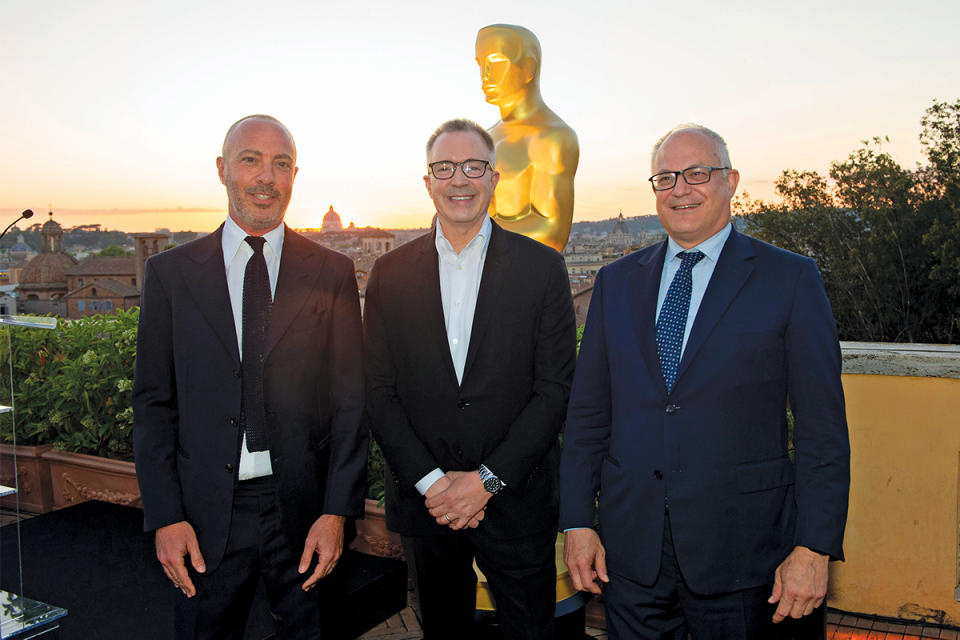Academy CEO Bill Kramer on Oscars’ Future, ‘Exploring’ Gender-Neutral Acting Categories and Upcoming ABC Negotiations

The Oscars will turn 100 in 2028.
But with dwindling ratings for its telecast, to say nothing of the existential problems facing the movie business, will the show be around for another 100 years? It’s falling to Bill Kramer, the CEO of the Academy of Motion Picture Arts and Sciences, the organization behind the awards, to figure out a way for the Oscars to stay relevant and financially secure.
More from Variety
“The Academy sits in two worlds: the film industry and the nonprofit arts and culture sector,” Kramer says. “And both are undergoing radical shifts in their business models right now. We need to diversify our support to ensure we thrive for the next century.”
Kramer took over the Academy in July 2022, having built a career in fundraising for nonprofits like the Sundance Film Festival, CalArts School of the Arts and, most recently, the Academy Museum of Motion Pictures. Last month, under his leadership, the organization launched one of its most significant undertakings: Academy100, a global outreach and fundraising initiative aimed at drumming up $500 million in the next four years. It’s off to a strong start, having already reached 20% of its goal, thanks to partners like Rolex.
Still, after the ravages of the pandemic and the strikes, a tough road lies ahead. The box office is down 26% from 2023, and media conglomerates like Paramount Global are being offered up for fire-sale prices. Asking the people who run these companies for money is tricky.
Kramer also faces a challenging set of talks with ABC, the awards show’s partner and distributor since 1960, about renewing the Oscars telecast. While the current deal — negotiated in 2016 and reported to be upwards of $100 million — is set to expire in 2028, both ABC and the Academy say negotiations are expected to begin later this year.
But the world has changed since 2016. Oscar ratings hit their lowest point ever in 2021. They have improved over subsequent telecasts, but the show reaches just under 20 million households, a far cry from the 50 million that watched as “Titanic” took home best picture in 1998. Kramer and others argue that the two most recent ceremonies, in 2023 and 2024, both emceed by Jimmy Kimmel and well-reviewed, signaled that the Oscars are getting their mojo back. And Dana Walden, who oversees ABC as co-chairman of Disney Entertainment, argues that improvements have been made.
“They should keep moving in the direction of the past two years,” she says. “I think the show has been excellent. People with extensive live event and live TV experience produce it. Regarding future distribution, we are actively engaged in discussions about what that might look like. We’ve made decisions in the past about keeping it exclusively on broadcast. Our affiliates appreciate it and spend a lot of time trying to eventize the show. Creating something they can take ownership of in the future has been, I think, in our best interest. But what lies in the future? I’m not 100% sure, but we talk about it actively and often. The landscape is changing at an extremely dynamic pace.”
Like any long-standing organization, controversies have not been absent in the Academy’s nine-decade history—#EnvelopeGate, #OscarsSoWhite, and #TheSlap are a few of the recent disruptions. On May 29, the Academy announced an executive restructuring that included several promotions. In addition, the org announced the departure of Jacqueline Stewart, Academy Museum director, and the retirement of 25-year veteran Randy Haberkamp, who served as the executive vice president of library, archive, and SciTech (the exits are not related to the restructure).
Omitted from the press release were the layoffs that have occurred throughout the organization due to merging and consolidation. Impacted employees included four from the Sci-Tech council—Mary Howard, Cameron Jappe, George Joblove, and Norma Vega—who departed on May 10. The Academy also runs four L.A. theater operations, whose teams were merged.
It’s a notable development, nearly a year after at least four Black leaders left the organization, over many months, for varying reasons. Kramer and President Janet Yang addressed this in an email to members. The unfortunate exits of POC leaving leadership positions in Hollywood isn’t a symptom unique to only the Academy; it’s been seen throughout multiple studios and companies. Nonetheless, Kramer maintains that the organization is still dedicated to DEIA initiatives and supporting its global membership amid a rapidly changing media climate.
After the Oscars were criticized for the lack of Black acting nominees in 2015 and 2016 and reporting revealed that the Academy was overwhelmingly composed of white men, the organization instituted sweeping reforms. As a result, the group has nearly doubled its membership to roughly 11,000 industry professionals, with more women and people of color among their ranks. Oscar-winner Marlee Matlin, the first deaf person to win an acting award for her performance in “Children of a Lesser God” (1986), joined the Board of Governors in 2022. It took one conversation with Kramer after the first Zoom meeting, where everyone was talking over one another, making it difficult for her to get all the information through her ASL interpreter. “Kramer recognized it as soon as I brought it up, almost as if he already knew,” Matlin recalls. “He’s engaged and has been a true ally.”
Jason Blum, head of the production company Blumhouse, has been a fierce advocate for movie theaters and was one of the leading voices pushing for the expansion of theatrical release requirements to be considered for best picture. Blum wanted the Academy to go further than the now-implemented 10 out of 50 top markets. “We were trying to support studios’ promotional campaigns for a specific film since that’s not something you always see with streamers,” Blum says. “Although we tried to set it up so that it could work for big studios, smaller distributors, and streamers, it didn’t go our way. I think there are few organizations, like the Academy, with the power to support theatrical releases the way AMPAS can. I believe it’s in all our interest not to let the theatrical experience disappear.”
As Kramer sits in the Variety offices, wearing a finely tailored blue suit and radiating the optimistic persona he has carefully curated over more than 30 years in the nonprofit sector, he opens up about the challenges facing the Oscars and his efforts to keep them relevant.

Read: Variety’s Awards Circuit for the latest Primetime Emmy predictions in the major categories.
You majored in business administration and received a master’s in urban planning. What made you decide to come to Hollywood?
I grew up with an incredible love for film and pop culture. We were a big moviegoing family, and film was always a part of my life. Growing up in Baltimore County, I didn’t realize you could work in the industry. I knew I wanted to work in the arts.
Why is Academy100 vital to the organization’s future?
People often forget that the Academy is a nonprofit organization. We’re fortunate to have an incredible relationship with Disney-ABC for the show, which makes up 70% of our overall revenue. Our current deal with them runs through our 100th Oscars in 2028. Between now and then, I aim to diversify our support base. Any healthy organization should be thinking about that.
How have studios responded to the diversity standards you have implemented?
Like the Academy, studios are more focused on diversity than they were a decade ago. Our inclusion standards, which recently went into effect, have been successful. We continuously look for ways to refine them. The Academy, being highly visible within the industry, can help lead these conversations. We work with our members to ensure they watch movies with an open mind, considering excellence across race, ethnicity, and genre. The diversification and globalization of our membership align with how the world is evolving, keeping the Academy relevant and connected to a global industry.
As part of the diversity and inclusion standards, movie studios are required to submit a RAISE form, a confidential form to prove the film meets two out of the four standards required to be deemed eligible for best picture consideration. The Academy hasn’t released any preliminary data regarding how many films submitted, met or deemed ineligible. Is AMPAS willing to share that in the future?
We’re committed to continuing this work. This past year was the first year it was mandated. We’ll continue to assess this with our studio and distribution partners. Over the past decade, international representation at the Oscars has grown, and more international films are submitted for best picture. We want to be sensitive and inclusive globally, as conversations around this topic can vary by country.
The Academy Museum’s recent exhibition, “Hollywoodland,” on the industry’s Jewish founders, has faced criticism for being overly negative and antisemitic. How are you addressing those concerns, and what went wrong?
The feedback we’ve received since the exhibition opened is important, and we’ve already taken some initial steps to immediately address some concerns raised. The museum is also convening a group of leading museum experts with backgrounds in the Jewish community, civil rights and other marginalized communities to advise us on how we can add additional context to the exhibition.
The Academy has undergone recent changes, which include an organizational restructuring that resulted in layoffs. Could you discuss how it shakes up morale and how you’re supporting those affected?
Since becoming CEO, I’ve been looking at the Academy’s structure, including the museum and archive, to create a unified focus, mission, and vision. We’re bringing teams together to create a shared purpose and elevate our work. Recently, we moved our Sci-Tech Council and Sci-Tech Awards to our membership, industry, and awards team to bring their work closer to our Board of Governors, budgeting, and goal setting. We strive to be as transparent as possible and support affected employees. It’s not happening often, but in those moments where it does, we take it seriously. There aren’t plans for wholesale layoffs, and I’d like to keep it that way. When bringing teams together, there are shifts in personnel.
Industry analysts think the Oscars will have trouble getting a deal that’s anywhere near the reported $100 million it previously commanded.
Since I became CEO, we’ve had extensive internal planning conversations about changing the success metrics for the show. Domestic versus international, linear versus streaming and how we monetize the show. Any new deal will look at these components differently than our previous agreement from 2016. We must change how we transmit, distribute and engage with the Oscars. My hunch is that will change when we approach this contract.
The theatrical movie business is struggling. What message do you tell studios, especially independents, that need to weigh profitability versus being considered for Oscars?
The box office situation is heartbreaking. Anyone interested in the Oscar race will meet our theatrical eligibility requirements. One of the goals of that shift was to say, ‘We want audiences beyond New York and L.A. to know these movies and see these films.’ We believe in theatrical releases and encourage our members to see movies in theaters while balancing digital access through our Academy Screening Room.
The show’s runtime has been a topic, especially when recognizing all categories. How will you address that?
We’re lucky to have a strong partnership with ABC. They’re excellent partners and engage in productive and strategic conversations with us. We all want to put on an entertaining show representing our institution beautifully while staying true to our mission. Early planning allows us to deal with unknown variables, such as nominees, while focusing on the show’s theme, design, and production. Bob [Iger] and Dana [Walden] have been exceptional leaders interested in keeping our collaborative partnership alive.
For decades, there have been rumors about the AMPAS members not voting. Will the Academy disclose how many of its members vote during each ceremony?
I’m happy to share that the vast majority of our members vote. The number of members voting has increased every year during my time as CEO, and I hope that trend continues.
The Academy recently announced it will have a best casting Oscar beginning in 2026. Will that award be included in the telecast?
The casting award will be handed out during the 98th Oscars cycle. This year, we will work with our board to determine the best way to honor casting. The more disciplines we can recognize, the better it will be for everyone. How we do this is a slightly more complex conversation. But we will work hard to honor every category properly.
Your current deal with ABC only allows 23 categories to be televised. Is increasing that number part of your talks?
There are many ways to honor all categories equitably. When new categories are on the horizon, we need to have creative conversations, and we’re eager to do so.
Are you considering adding an Oscar for best stunts?
Early discussions with our Production and Technology branch, which includes stunts, are ongoing. They are responsible for developing a proposal to be entertained by the Board, like the process with casting.

Jimmy Kimmel has emceed the Oscars four times. But John Mulaney hosted the Governors Awards in January and was hilarious. Could he host the next ceremony?
We are lucky to have Jimmy [Kimmel], who helped create one of the best Oscars last year. John Mulaney also did an incredible job. All I will say is, with whomever hosts the show moving forward, we want to continue with this tone of celebration, respect, humor, and a great love of movies. We have some great options.
Some awards organizations, such as the Independent Spirit Awards and the Gothams, have made the acting categories gender-neutral. Will the Oscars do the same?
We are exploring this topic with our awards, membership, equity, and inclusion committees and soon with our Board of Governors. It’s in the early exploration stage and one of many conversations about the future of awards and the Oscars. We are still investigating how it could look.
“I’m Just Ken” was one of the all-time music moments at the Oscars. How do you top that?
We worked hard on that piece with the producers, Ryan Gosling, Mark Ronson, Slash, and all the stars from the film. Ynon [Kreiz] from Mattel was a big supporter of this. Everyone got on board, and it was a home run. We need big, fun moments that celebrate cinema every year. There was such a sense of over-the-top joy just being in the audience. That’s what we should be doing every year.
It’s Pride Month. Do you have advice for the next Bill Kramer from the LGBTQ community, who may struggle to see themselves in this business?
Thank you for asking. I’m rarely asked about that. I’m proud to be out and in this role. I’m fortunate to work for an organization that celebrates diversity, allowing me to be authentically myself. It’s essential to own your sense of self for your mental health and success. Don’t let that part of you go just to accommodate a job. It’s dangerous and a matter of life or death in many cases. My advice is to anyone who feels “other”—own your sense of self. It’s essential to your mental health and success.
Best of Variety
Sign up for Variety’s Newsletter. For the latest news, follow us on Facebook, Twitter, and Instagram.

 Yahoo News
Yahoo News 
